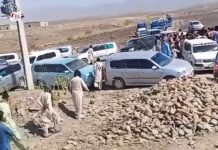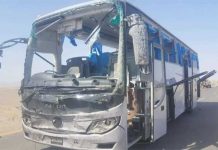Prepared by Zeno Baloch
This interview was conducted by Richard Carleton in Beirut in 1970
Kanafani was affiliated with Popular Front for the Liberation of Palestine (PFLP). He was also the author of many books, such as, Men in the sun, All that is left to you and several others.
He was assassinated on 8th July 1972 in Beirut at the age of 36.
He was Beirut based spokesperson of the Popular Front for the Liberation of Palestine. The initial conflict was fought between the Palestine Liberation Organization under the leadership of Yasser Arafat and the Jordanian Armed Forces under the leadership of king Hussein. PFLF however got involved into the conflict with a more progressive ideology, with secular, Marxist–Leninist and with revolutionary motives.
Note: The author did not make any exceeding or any exaggeration into the interview except validifying some grammatical errors, as the speaker is not a native and makes some grammatical mistakes and rarely improved the sentence to make the context more graspable as necessity.
The Interviewer: The Beirut leader of the Popular Front (PFLP, Popular Front for the Liberation of Palestine) is Ghassan Kanafani. He was born in Palestine but fled in 1948, as he puts it, from Zionist terror. Since then he has been plotting the destruction of both; the Zionists and the reactionary Arabs.
G. Kanafani: What I really know is, the history of the world is always the history of the weak people fighting the strong people. Of weak people who have a correct case, fighting the strong people who use their strength to exploit the weak.
The Interviewer: Turn to the fighting that has been going on in Jordan in the recent weeks. It is your organization that has been one side of the fight. What has it achieved?
G. Kanafani: One thing. That we have a case to fight for. That is too much. The Palestinian people prefer to die standing then to loose their case. What we achieved! We achieved proving that the king is wrong. We achieved proving that this nation is going to continue fighting till victory. We achieved that our people could never be defeated. We achieved teaching every single person of this world that we are a small brave nation who are going to fight till the last drop of their blood. To put justice to ourselves after the world failed in giving it to us. This is what we have achieved.
The Interviewer: It does seem that the war, the civil war has been quite fruitless……
G. Kanafani: (He cuts the talk and interrupts angrily) It is not a civil war. It is a people struggle, defending themselves against a fascist government, which you are defending just because king Hussain has an Arab passport. It is not a civil war.
The Interviewer: Or a conflict?
G. Kanafani: It is not a conflict either. It is a liberation movement fighting for justice.
The Interviewer: Well, whatever it is, but……
G. Kanafani: (Interrupts again angrily) It is not whatever. Because this is where the problem starts. This is what you keep in mind while asking me all the questions. This is exactly where the problem starts. This is the people who are discriminated, who are fighting for their rights. This is historic. If you say, it is a civil war then your questions will be justified. If you say it is a conflict then of course it will be a surprise to know what is happening.
The Interviewer: Why won’t your organization engage in peace talks with Israelis?
G. Kanafani: You do not exactly mean peace talks, you mean capitulation, you mean surrendering.
The Interviewer: Why not just talk?
G. Kanafani: Talk to whome?
The Interviewer: Talk to the Israeli leaders.
G. Kanafani: That is kind of a conversation between the sword and the neck you mean!
The Interviewer: When there is no sword and no guns in the room, you could still talk.
G. Kanafani: No. I have never seen conversation between the colonialist case and a national liberation movement.
The Interviewer: But despite this why not talk?
G. Kanafani: Talk about what?
The Interviewer: Talk about the possibility of not fighting.
G. Kanafani: Not fighting for what?
The Interviewer: Not fighting at all, no matter what for.
G. Kanafani: People usually fight for something and they stop fighting for something. So you cannot tell me even why should we speak and about what. Or talk about stop fighting. And why should we?
The Interviewer: Talk to stop fighting to stop the death and the misery, the destruction, the pain.
G. Kanafani: The misery, the destruction, the pain and the death of whome?
The Interviewer: Of Palestinians, of Israelis, of Arabs.
G. Kanafani: Of the Palestinian people who are uprooted, thrown in the camps, living in starvation, killed for twenty years and forbidden to use even the name Palestinian?
The Interviewer: Then better to stop the war to stop the death.
G. Kanafani: Maybe to you, not to us. To us, to liberate our country, to have dignity, to have respect, to have our mere human rights; these are something as essential as life itself.
The Interviewer: You called king Hussain a fascist. Who else amongst the Arab leaders are you totally opposed to?
G. Kanafani: We consider the Arab governments of two kinds. Something we call the reactionaries, who are completely connected with the imperialists, like king Hussain, like Saudi Arabian government, Moroccan government and Tunisian government. And then we have some other Arab governments which we called the military petty bourgeois governments like, Syria, Iraq, Egypt, Algeria and so on.
The Interviewer: Just to end with, let me get back to the hijacking of the aircraft. On reflection, do you think that is now a mistake?
G. Kanafani: We did not make a mistake in hijacking them. They contest us. We did one of the most correct things we have ever done.
Disclaimer: The views and opinions expressed in this article are those of the author and do not necessarily reflect the official policy or position of The Balochistan Post or any of its editors.





























